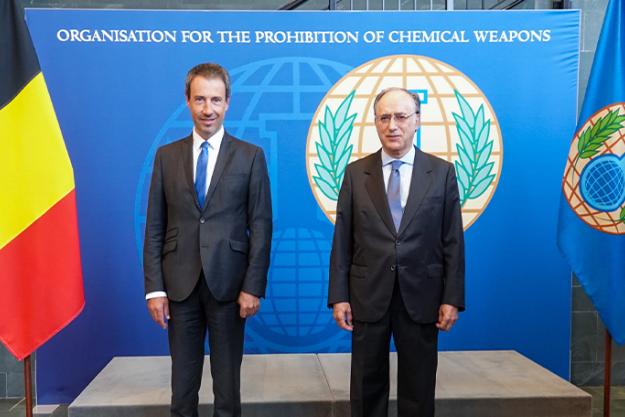
THE HAGUE, Netherlands — 9 July 2020 — The Director-General of the Organisation for the Prohibition of Chemical Weapons (OPCW), H.E. Mr Fernando Arias, and the Minister of Foreign Affairs and Defence of Belgium, H.E. Mr Philippe Goffin, met today at OPCW Headquarters in The Hague.
The Foreign Affairs and Defence Minister congratulated the Director-General and the Technical Secretariat for their efforts to ensure a world free of chemical weapons. He remarked: “The return of Belgium to the Executive Council for the next two years comes at an important time, during which the OPCW is facing increasingly difficult circumstances. As the use of chemical weapons cannot go unpunished, the publication of the first report of the Investigation and Identification Team is an important first step towards accountability. The OPCW can continue to count on the support of Belgium.”
The Director-General briefed the Minister of Foreign Affairs and Defence on the OPCW’s progress in implementing the Chemical Weapons Convention as well as on the work of the Investigation and Identification Team. Following Belgium’s €2M contribution to the new OPCW Centre for Chemistry and Technology in 2018, the Director-General also provided a status update on the project. Both the Director-General and the Minister acknowledged the need to intensify international cooperation and assistance to promote the peaceful application of science and technology in chemistry.
The Director-General underlined the deep ties between Belgium and the OPCW and remarked: “Belgium has my sincere gratitude for its unwavering commitment to the goals of the Convention and for its support to the OPCW. We look forward to continued cooperation with Belgium to ensure that chemical weapons become a thing of the past.”
Background
Belgium has been an active member of the OPCW since the Chemical Weapons Convention entered into force in 1997. Belgium is a member of the Executive Council, the OPCW’s executive organ, which is charged with promoting the effective implementation of and compliance with the Chemical Weapons Convention as well as supervising the activities of the Organisation’s Technical Secretariat.
As the implementing body for the Chemical Weapons Convention, the OPCW, with its 193 Member States, oversees the global endeavour to permanently eliminate chemical weapons. Since the Convention’s entry into force in 1997, it is the most successful disarmament treaty eliminating an entire class of weapons of mass destruction.
Over 98% of all chemical weapon stockpiles declared by possessor States have been destroyed under OPCW verification. For its extensive efforts in eliminating chemical weapons, the OPCW received the 2013 Nobel Peace Prize.
